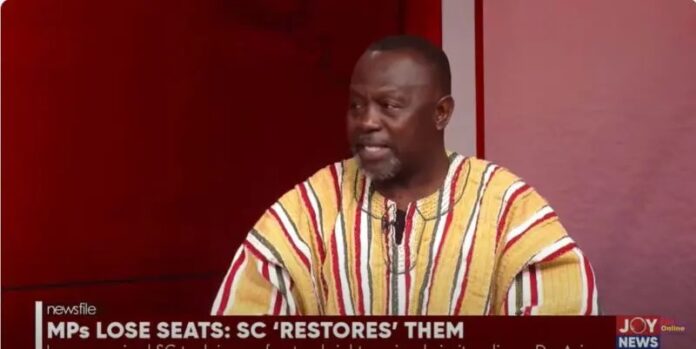Former Deputy Attorney General, Dr. Dominic Ayine, has accused the Supreme Court of overstepping its jurisdiction and acting prematurely in a recent decision involving the declaration of parliamentary seat vacancies.
Speaking on JoyNews‘ Newsfile on October 19, Dr. Ayine argued that the Court’s intervention was legally flawed and driven by a hasty attempt to assert its authority.
Dr. Ayine noted that the stay-of-execution mechanism only applies to judicial or quasi-judicial orders, which usually require an appeal to trigger the process.
However, in this case, there was no formal appeal or notice of appeal because the Speaker of Parliament did not allow a challenge, following parliamentary procedures.
Dr. Ayine argued that the absence of a pending judicial order meant the Court had no legal grounds to issue a stay.
“The Supreme Court in its ruling, in haste to assert its authority, grossly erred… When he [Alexander Afenyo-Markin] wanted to challenge Mr Speaker he was told no, he was going to give him leave to do so. So there was no appeal, there was no notice of appeal before any court of competent jurisdiction for there to have been a stay of execution.” he said.
His comments come after the Supreme Court issued a stay of execution on Speaker Alban Bagbin’s ruling, which declared four parliamentary seats.
He explained that the Constitution assigns jurisdiction over parliamentary seat vacancies to the High Court under Article 99(b).
According to him, the Supreme Court’s role would only arise indirectly, as a referenced jurisdiction. This would occur if the High Court while handling the case, needed clarification on constitutional interpretation and referred the matter to the Supreme Court.
“At best, the jurisdiction of the Supreme Court in this matter would be a referenced jurisdiction… The High Court would stay its hand, and the matter could be referred to the Supreme Court for interpretation.”
Dr. Ayine also cited concerns about the nature of the case brought before the Supreme Court. He explained that Mr. Afenyo-Markin’s suit, which was filed before the Speaker’s ruling, involved a hypothetical situation rather than an actual controversy.
“In Billson and Apaloo, the court was very clear that the Supreme Court does not deal with hypothetical situations but actual controversies.”
He added “the Supreme Court clearly erred, did not jurisdiction in this matter.”
ALSO READ:


